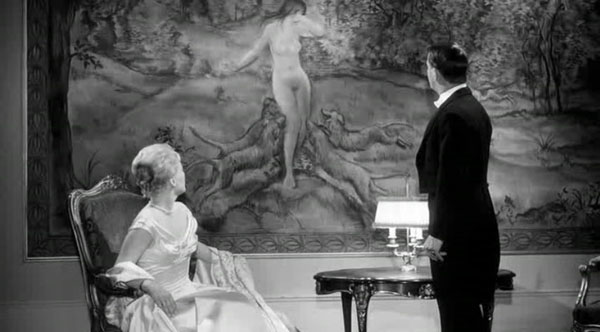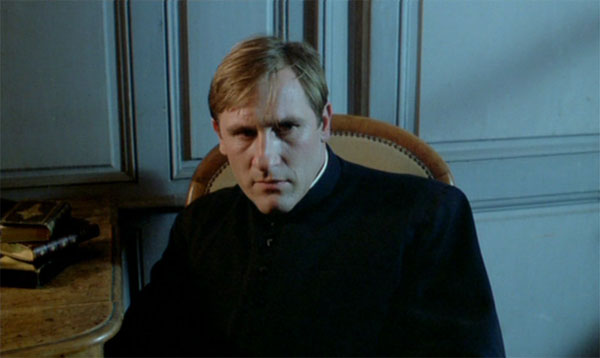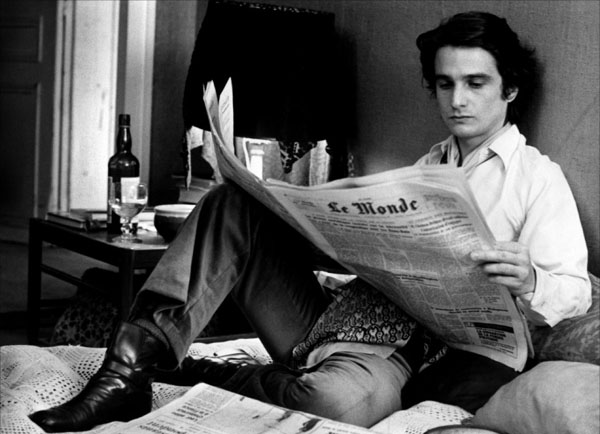It is, as Melissa Anderson puts it, an “ingenious program,” formally announced at the blog for BAM last week by David Reilly: “Since its inception in 1946, the Cannes Film Festival has gained a reputation as the film world’s most reliable hotbed for scandal: scenes clipped by censors moments before a film’s premiere, torrents of walkouts, and endless volleys of vicious repartee between the droves of moguls, critics, starlets, and dignitaries who descend upon the Palais des Festivals. Yet within the cavernous repository of Cannes controversy, there remains a place of honor for those films and directors eliciting that most visceral, ear-catching of hostile audience responses: the boo…. BAMcinématek’s survey Booed at Cannes (May 8—12 & 16—23) reveals a diverse array of films maudits and canonical classics subjected to a hearty hooting on the French Riviera.”
Today, as Ryan Lattanzio notes at Thompson on Hollywood, the series opens with Carl Theodor Dreyer‘s Gertrud (1964), “a psychological mood piece about a wealthy, bored aristocratic woman who takes up an affair with a young musician. Deemed a stuffy study of sofas and pianos—and an essay in how long a director can stretch a take—the film was loathed at Cannes. But it was second to Godard‘s Band of Outsiders on Cahier du Cinéma‘s top 10 of 1964, and is now regarded as one of Dreyer’s late-career greats. Nina Pens Rode gives a remarkably restrained performance as the title character, a caged bird in Danish high society.”
Tomorrow, it’s Maurice Pialat’s Grand Prize-winner Under the Sun of Satan (1987), “an extraordinary film, a religious drama with a carnal ferocity,” writes the New Yorker‘s Richard Brody. “Its rarity is surprising, given that its star is Gérard Depardieu, who gives one of his greatest performances. In fact, the movie is something of an all-star team—it’s adapted from a novel by Georges Bernanos (whose novels Diary of a Country Priest and Mouchette were adapted into masterworks by Robert Bresson); it co-stars Sandrine Bonnaire (Pialat’s great discovery, from A Nos Amours); its music is composed by Henri Dutilleux (a modernist with an Impressionistic style who ranks high on the list of 20th-century composers and, at 97, is still at it); and its cinematography is by Willy Kurant (who shot Jean-Luc Godard’s Masculine Feminine, Agnès Varda’s The Creatures, Orson Welles’s The Immortal Story—and Louis C.K.’s Pootie Tang)…. Whereas Bresson’s naturalistic religion condenses a vast force into an infinitesimal gesture, Pialat expands spiritual power to a large-scale struggle that bursts out in physical and emotional violence.”
On Friday, Michelangelo Antonioni‘s L’Eclisse (1962). Paul D’Agostino for the L: “Antonioni’s films are affecting, alluring, unmistakably auteuristic affairs weaving tales of love tinged with quotidian terror; of societal disquiet as both political and personal; of urbanity, of domesticity, of great wide opens; of the fragile territories of human interactions, endeavors, emotions.”
Saturday: David Lynch’s Twin Peaks: Fire Walk With Me (1992), and we return to Artforum, where Melissa Anderson argues that this one “stands as the title in the BAM showcase that benefits the most from revisiting. Recounting the last week in the life of troubled high-school homecoming queen Laura Palmer (Sheryl Lee), Fire Walk with Me bears many of Lynch’s trademarks: the sinister qualities of small-town life, blonde and brunette protagonists, the porous boundary between dream and waking. But Lynch had never before created—or extended such empathy toward—a heroine as haunting or haunted as teenage Laura, tormented by years of unspeakable abuse. She is the blueprint of abjection and bifurcation for Betty Elms/Diane Selwyn, the fractured lead character in Lynch’s supreme achievement, Mulholland Drive—for which he would be awarded best director at Cannes in 2001.”
And she notes of Saturday’s second feature that “David Lynch, who has the distinction of being the only auteur with two films in the BAM series, simply smiled goofily as the Grand Théâtre Lumière erupted in boos after he mounted the stage to accept the Palme d’Or in 1990 for Wild at Heart.”
Then on Sunday, before a three-day break, Jean Eustache’s The Mother and the Whore (1973). Aaron Cutler in the L: “Roving young intellectual Alexandre (played by French New Wave icon Jean-Pierre Léaud) moves between his embittered, oft-betrayed domestic partner Marie (Bernadette Lafont, also then-iconic) and his promiscuous, wounded latest lover Veronika (Françoise Lebrun, a former lover of Eustache making her film debut). Alexandre, still nursing the failure of his generation’s activist ideals, wraps himself up in film references while hurting the people around him. Both women see his nature, and nevertheless seek his company.”
You can click through a slide show of films featured in the series at the Wall Street Journal.
Meantime, BAMcinématek has announced the full lineup for BAMcinemaFest 2013, opening on June 19 with David Lowery’s Ain’t Them Bodies Saints, a hit at Sundance and slated to screen during Critics’ Week, and closing on June 28 with Destin Cretton’s Short Term 12, winner of the Grand Jury Prize at SXSW in March. For descriptions of all the BAMcinemaFest titles, see Nick Dawson at Filmmaker and/or Erin Whitney at Indiewire. And at the L, Henry Stewart‘s already picked out “5 Must-See Movies.”
Update, 5/10: “Federico Fellini’s 1990 swan song The Voice in the Moon (May 16) seemed to disappear off the face of the earth,” notes Matt Prigge in Metro. “Featuring an unaccountably reined-in Roberto Benigni—plus a crazed dance scene set to Michael Jackson—it’s a problematic but fascinating film. But how many know that? It became the director’s last, and his only one to never score an American release. Others have trickier histories. Jean Eustache’s talky 1973 epic The Mother and the Whore (May 12) has become a classic, yet has eluded home video since a VHS release in the 1990s. Luis Buñuel’s El (May 20) and François Truffaut’s The Soft Skin (May 22)—bemoaned for being a step down from Jules and Jim, a Cannes toast in 1962—have been similarly hard to peep. With Cannes 2013 looming, perhaps we can imagine a future iteration of this program resuscitating this year’s opening night film, The Great Gatsby.”
For news and tips throughout the day every day, follow @KeyframeDaily on Twitter and/or the RSS feed. Get Keyframe Daily in your inbox by signing in at fandor.com/daily.







